Cloud gaming presents a unique landscape of costs and benefits, with subscription models and potential hidden fees influencing overall expenses. Many services offer free trials, enabling users to explore their offerings before making a financial commitment. With advantages like enhanced accessibility and reduced hardware requirements, cloud gaming appeals to those seeking flexibility and convenience in their gaming experience.
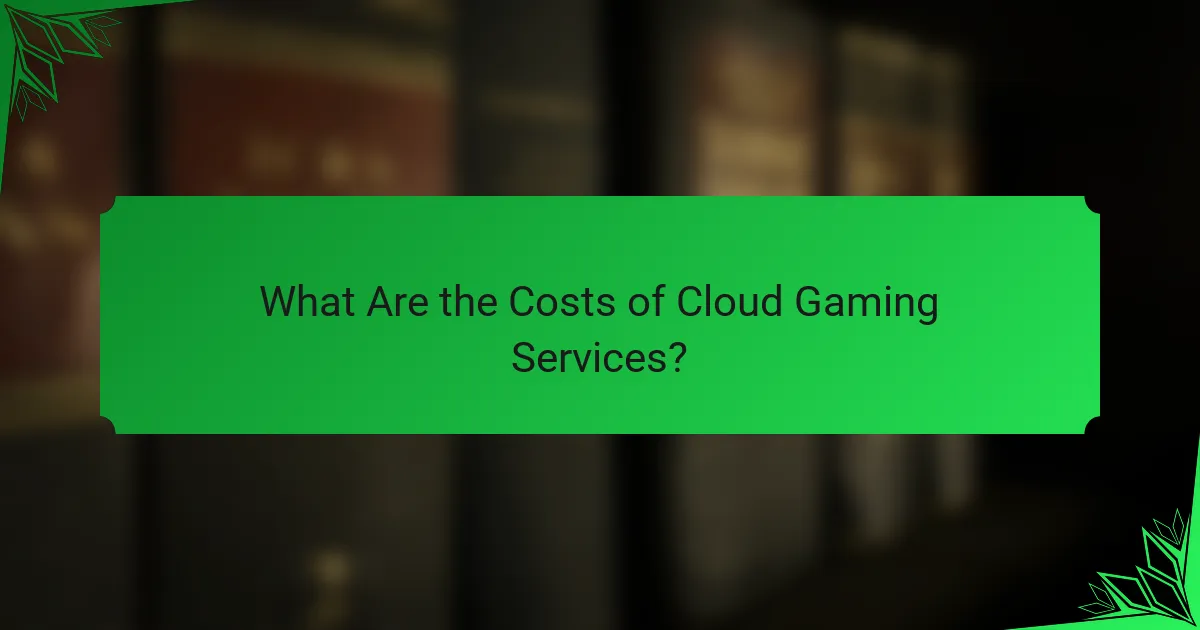
What Are the Costs of Cloud Gaming Services?
The costs of cloud gaming services can vary significantly based on the subscription model, game access, and additional fees. Users should consider factors such as subscription fees, pay-per-play options, hardware requirements, internet bandwidth costs, and potential hidden fees when evaluating overall expenses.
Subscription fees
Subscription fees are a common cost associated with cloud gaming services, typically ranging from around $5 to $15 per month. These fees often provide access to a library of games, allowing users to play as much as they want within the subscription period. Some services may offer tiered pricing, where higher tiers grant access to premium titles or additional features.
Pay-per-play options
Pay-per-play options allow gamers to purchase access to individual titles without a subscription. This model can be beneficial for those who play infrequently or want to try specific games. Prices for pay-per-play can vary widely, often falling between $10 and $60 per game, depending on the title and its popularity.
Hardware requirements
While cloud gaming reduces the need for high-end hardware, users still require a compatible device, such as a PC, console, or smart TV. Additionally, some services may recommend specific hardware configurations to optimize performance, which could involve costs for upgrades or purchases. It’s crucial to check the service’s requirements to avoid unexpected expenses.
Internet bandwidth costs
Cloud gaming demands a stable and fast internet connection, typically requiring speeds of at least 15 Mbps for standard quality and up to 50 Mbps for high definition. Depending on your internet service provider, this may lead to higher monthly costs if you need to upgrade your plan. Additionally, heavy usage can result in data overage fees if your plan has limits.
Hidden fees
Hidden fees can arise from various sources, including in-game purchases, additional content, or subscription renewals. It’s essential to read the fine print of any service agreement to understand potential costs. Users should also be aware of any cancellation fees or charges for accessing premium features that may not be included in the base subscription.
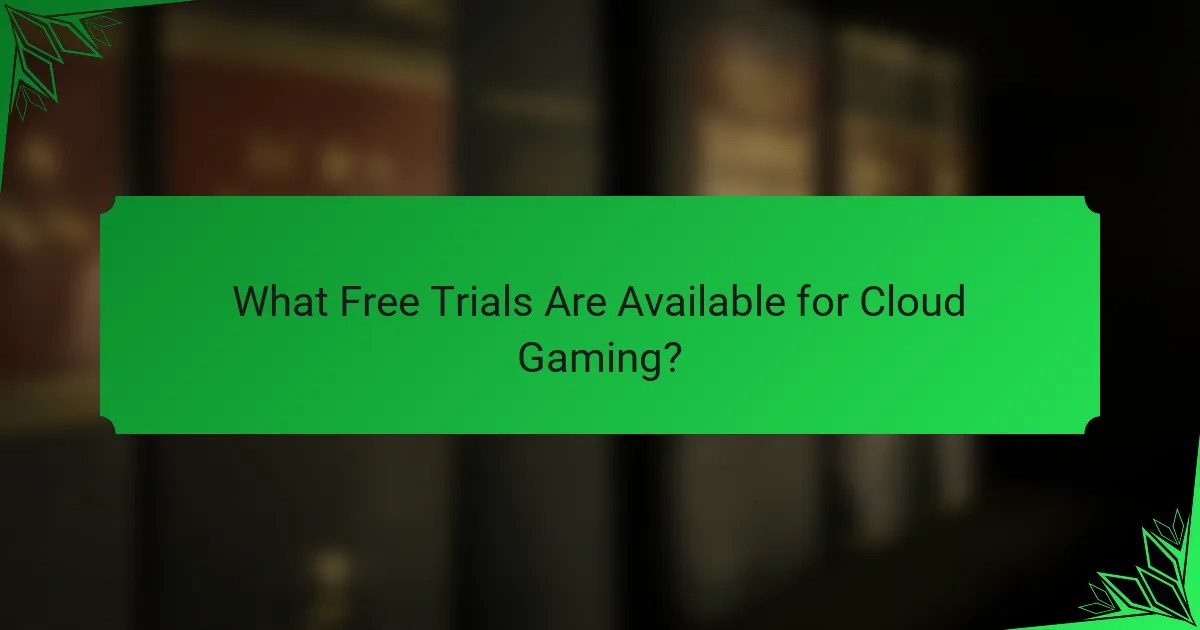
What Free Trials Are Available for Cloud Gaming?
Several cloud gaming services offer free trials, allowing users to experience their platforms before committing financially. These trials typically range from a few days to a month and provide access to a selection of games and features.
NVIDIA GeForce NOW trial
NVIDIA GeForce NOW offers a free tier that allows users to play games they own on platforms like Steam and Epic Games Store. The trial provides access to standard features, but sessions are limited to one hour, and users may experience longer wait times during peak hours.
To get started, simply sign up on the GeForce NOW website and link your game accounts. Keep in mind that while the free tier is a great way to test the service, upgrading to the paid plan can enhance your experience with longer session times and priority access.
Xbox Cloud Gaming trial
Xbox Cloud Gaming, part of Xbox Game Pass Ultimate, offers a free trial for new subscribers. This trial typically lasts for one month and provides access to a vast library of games that can be played on various devices, including PCs, consoles, and mobile devices.
To take advantage of the trial, sign up on the Xbox website or through the Xbox app. Be aware that after the trial period, a subscription fee will apply, so consider exploring the library to see if it meets your gaming needs before committing.
PlayStation Plus trial
PlayStation Plus offers a trial period for new users, allowing access to its cloud gaming features as part of the subscription service. The trial usually lasts for a month and includes a selection of games available for streaming on PlayStation consoles and PC.
To start the trial, create a PlayStation Network account and subscribe to PlayStation Plus. Remember that once the trial ends, you will need to continue with a paid subscription to maintain access to the cloud gaming library and other benefits.

What Are the Benefits of Cloud Gaming?
Cloud gaming offers several advantages, including enhanced accessibility, reduced hardware requirements, and immediate access to games. These benefits make it an appealing option for gamers looking for flexibility and convenience.
Accessibility across devices
Cloud gaming allows players to access their favorite games on various devices, such as smartphones, tablets, laptops, and smart TVs. This means you can enjoy gaming without being tied to a specific console or computer.
Many cloud gaming services support cross-platform play, enabling seamless transitions between devices. For example, you can start a game on your PC and continue playing on your mobile device while on the go.
No need for high-end hardware
One of the significant benefits of cloud gaming is that it eliminates the need for expensive gaming hardware. Since the processing is done on remote servers, players can enjoy high-quality graphics and performance on low-end devices.
This can save you hundreds of dollars, as you won’t need to invest in the latest gaming console or a powerful gaming PC. Instead, a stable internet connection and a compatible device are all that’s required.
Instant game access
Cloud gaming platforms typically offer instant access to a library of games without the need for lengthy downloads or installations. Players can jump into a game within minutes, making it easy to try new titles or revisit old favorites.
This immediacy is particularly beneficial for casual gamers who may not want to commit to purchasing a game upfront. Many services provide free trials or subscription models, allowing you to explore a wide range of games with minimal financial commitment.
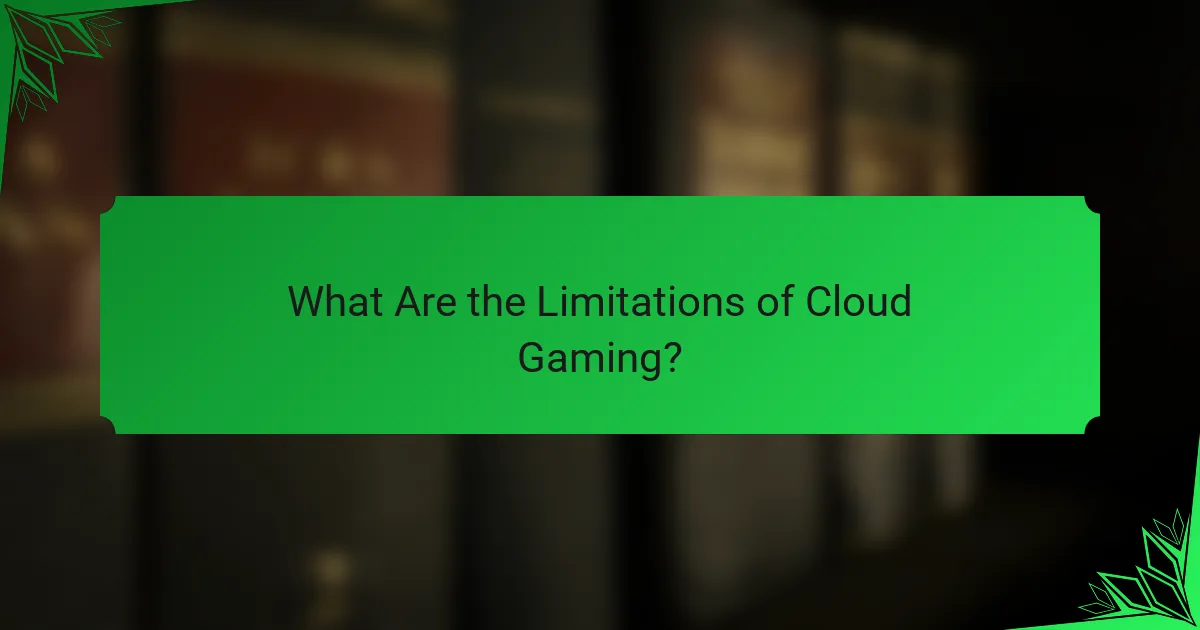
What Are the Limitations of Cloud Gaming?
Cloud gaming has several limitations that can affect the overall experience, including latency, reliance on a stable internet connection, and access to a limited selection of games. Understanding these factors is crucial for gamers considering this technology.
Latency issues
Latency refers to the delay between a player’s input and the game’s response. In cloud gaming, this delay can be noticeable, especially in fast-paced games where quick reactions are essential. Latency can vary widely, often falling within the low tens of milliseconds to over a hundred milliseconds, depending on the user’s internet speed and the distance to the server.
To minimize latency, gamers should choose services that offer local servers and ensure they have a high-speed internet connection. Testing the connection before committing to a cloud gaming service can help identify potential issues.
Internet dependency
Cloud gaming is heavily reliant on a stable and fast internet connection. Users need a minimum bandwidth of around 15 Mbps for a decent experience, but higher speeds are recommended for optimal performance. Fluctuations in internet speed can lead to buffering, reduced quality, or disconnections.
Gamers should consider using a wired connection instead of Wi-Fi to enhance stability. Regularly checking internet speed and ensuring that no other devices are hogging bandwidth during gaming sessions can also improve performance.
Limited game libraries
Many cloud gaming platforms offer a curated selection of games, which can be significantly smaller than traditional gaming libraries. This limitation means that popular titles may not always be available, and users might miss out on certain games they wish to play.
When choosing a cloud gaming service, it’s essential to review the game library to ensure it includes the titles you are interested in. Some services may offer free trials, allowing users to explore the available games before making a financial commitment.
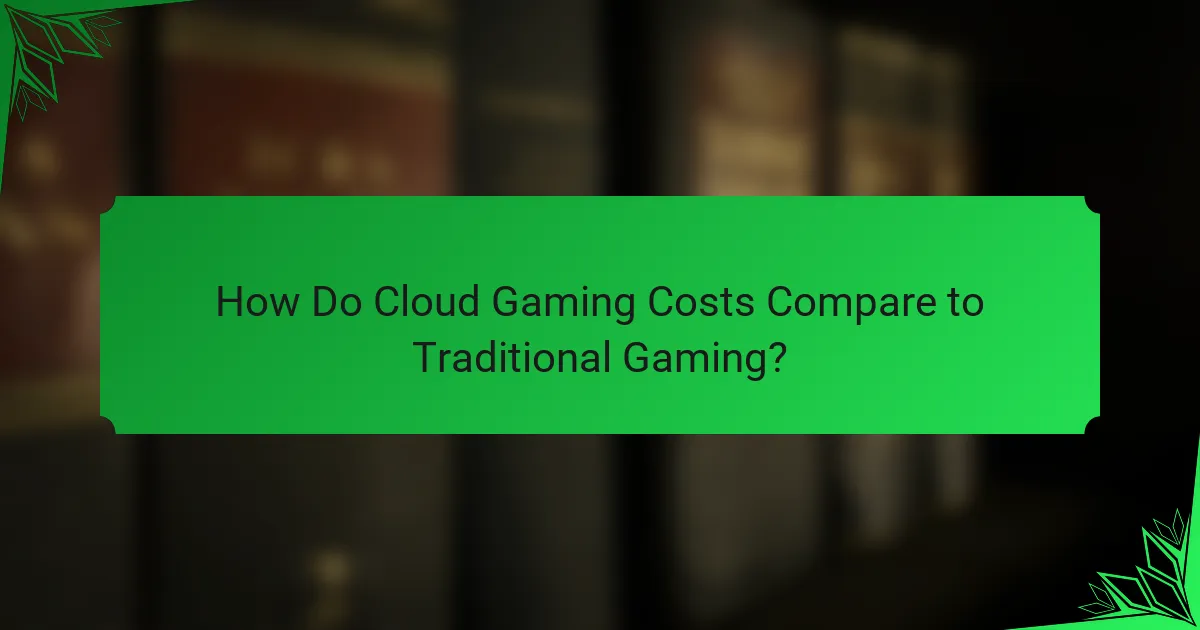
How Do Cloud Gaming Costs Compare to Traditional Gaming?
Cloud gaming typically offers a lower initial investment compared to traditional gaming, as it eliminates the need for expensive hardware. However, ongoing costs can vary significantly based on subscription models and game availability.
Initial investment differences
With traditional gaming, players often need to purchase a console or a high-performance PC, which can range from a few hundred to over a thousand dollars. In contrast, cloud gaming services usually require only a compatible device and a stable internet connection, making the initial costs much lower, often just the price of a subscription.
Some cloud gaming platforms offer free trials, allowing users to test the service before committing financially. This can be a great way to gauge whether the service meets your gaming needs without upfront costs.
Ongoing costs comparison
Ongoing costs for cloud gaming typically involve monthly subscription fees, which can range from around $5 to $15 per month, depending on the service. Traditional gaming may incur costs through game purchases, which can be significantly higher, often around $60 or more per title.
Additionally, cloud gaming services may offer access to a library of games for a flat fee, while traditional gaming often requires buying each game individually. This can lead to substantial savings for gamers who play multiple titles.
Value for casual gamers
For casual gamers, cloud gaming can provide excellent value due to its lower costs and flexibility. Players can enjoy a variety of games without the need for a large investment in hardware or individual game purchases.
Moreover, the ability to play on multiple devices, such as smartphones, tablets, or smart TVs, enhances accessibility for casual gamers. This convenience allows for gaming on-the-go, making it easier to fit gaming into a busy lifestyle.
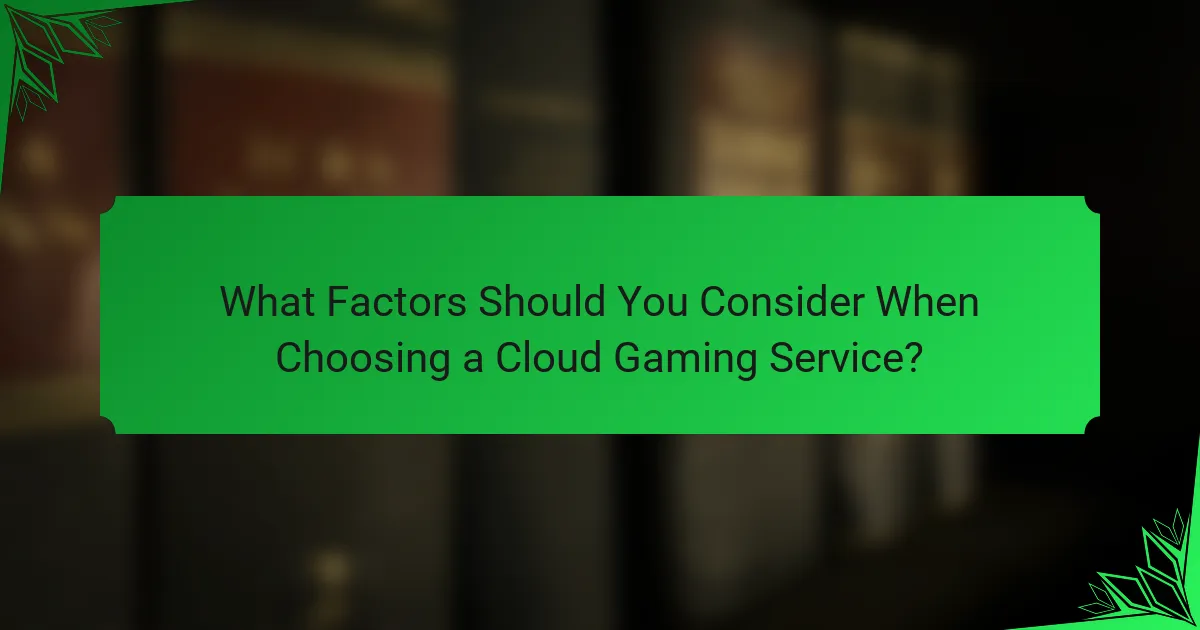
What Factors Should You Consider When Choosing a Cloud Gaming Service?
When selecting a cloud gaming service, consider factors such as game library availability, subscription costs, performance, and device compatibility. Each of these elements can significantly impact your gaming experience and satisfaction with the service.
Game library availability
The availability of games is a crucial factor when choosing a cloud gaming service. Look for platforms that offer a diverse library, including popular titles and new releases. Some services may focus on specific genres or platforms, which can limit your options.
Many cloud gaming services operate on a subscription model, granting access to a set library of games. For example, services like Xbox Cloud Gaming and PlayStation Now provide a rotating selection of titles, while others may allow you to purchase games individually. Check if the service supports the games you want to play before committing.
Additionally, consider the frequency of updates and new game additions. A service that regularly refreshes its library can keep your gaming experience exciting and engaging over time.
